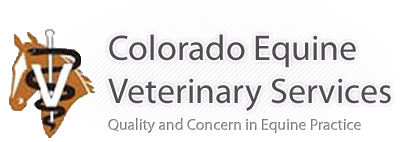Preventative Medicine
At Colorado Equine Veterinary Services, we strive to keep your horses healthy and productive. Preventative medicine is key to keeping horses well. It is much easier and less expensive to prevent illnesses than to treat them.
A Comprehensive Vaccination Program
Annual vaccinations are critical to maintaining the health of your horse. We recommend vaccinating once a year for Eastern/Western Encephalitis, Tetanus, and West Nile, as well as Rabies. Rhinopneumonitis/Influenza viruses should be vaccinated against every six months. If you have a busy show schedule, ask your veterinarian about further virus vaccinations.
A Dental Care with Power Float Check-up
Your horse’s teeth continue to change, producing sharp points on the inside and outside of the cheek teeth. These points can be painful and cause ulcerations of the tongue and on the inside of the cheeks. This can cause your horse to drop feed and resist the bit. The most complete and precise way to manage these problems is with yearly floating (or filing) to remove the points. Colorado Equine Veterinary Services can help with a full-mouth speculum and Power Float.
A quality wellness schedule will enhance your horse’s overall health.
The goal of an equine wellness schedule is to protect your horse’s health and minimize the chance of unexpected, life-threatening and costly illness.
Sample Wellness Schedule
Yearly physical exam – Complete in January, February or March
- Nutritional evaluation
- Coggin’s test (Equine Infectious Anemia)
- Blood tests (Complete blood count and chemistry panel) for older horses
Annual Spring Vaccinations – Complete in March, April or May— Minimum Recommendation
- Rhinopneumonitis
- Influenza
- Encephalitis (Eastern and Western)
- Tetanus
- West Nile Virus
- Intra-nasal Strangles (optional)
- Rabies
Booster Vaccinations
- Rhinopneumonitis and Influenza— Recommended in the spring and fall for most horses
Regular deworming
Protocol for Adult Horses (Greater Than 3 years old):
Low Shedders (0-199 Eggs Per Gram of Feces)
- May 1: Ivermectin
- November 1: Ivermectin + Praziquantel (Equimax, Zimectrin Gold)
Medium Shedders (200-500 Eggs Per Gram of Feces)
- May 1: Ivermectin
- August 1: Pyrantel (Strongid)
- November 1: Ivermectin + Praziquantel (Equimax, Zimectrin Gold)
High Shedders (>500 Eggs Per Gram of Feces)
- March 1: Ivermectin
- May 1: Pyrantel (Strongid)
- August 1: Ivermectin
- November 1: Ivermectin + Praziquantel (Equimax, Zimectrin Gold)
*Recommend feeding your horse after deworming.
Protocol for Foals, Weanlings, and Horses Less Than 3 years old:
- Day 0 – Mare should be dewormed at foaling with Ivermectin
- 3 months – Panacur double dose
- 6 months – Ivermectin
- 9 months – Pyrantel double dose (for tapeworms)
- 12 months – Ivermectin
- After 12 months, deworm as you would a Medium Shedder:
- May 1: Ivermectin
- August 1: Pyrantel or Benzimidazole
- November 1: Ivermectin + Praziquantel
At the age of 3, deworm based on Fecal Egg Count (FEC). Do a fecal test at least 12 weeks after last deworming to determine the protocol.
Annual dental examination and floating
Recommended every twelve months. Some horses may need to be floated more frequently.
Routine hoof care
Farrier visits every six to nine weeks, more often if needed.
